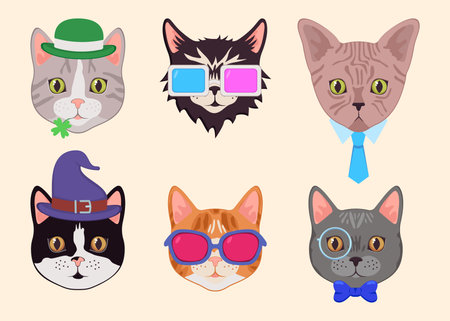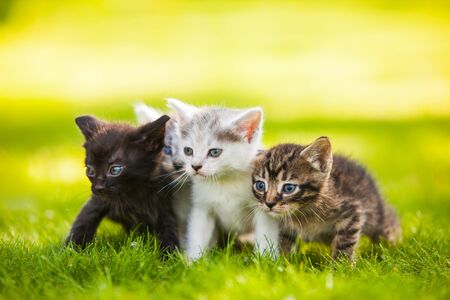1. Introduction: The Treasure of Crossbreed and Mixed Cats
In the heart of British homes, cats have always been cherished companions, but there’s a gentle shift happening across the UK—a newfound appreciation for crossbreed and mixed cats. While pedigree breeds have traditionally enjoyed the limelight, more cat lovers are discovering the unique charm and vitality that crossbreeds bring into their lives. These delightful moggies, with their patchwork heritage, are now being recognised not just for their diverse looks but also for their robust health and affectionate personalities. As more UK households open their doors to non-pedigree felines, we’re witnessing a cultural change—one that values character and companionship over a cat’s family tree. This article explores how crossbreed and mixed cats are becoming treasured members of British families, setting the scene for a broader understanding and acceptance that goes beyond pedigree popularity.
2. The Unique Charms of British Moggies
In the heart of countless British homes, you’ll find moggies—our affectionate term for mixed-breed cats—curled up on laps, sunbathing in window seats, or patrolling gardens with quiet confidence. Unlike their pedigree counterparts, British moggies are a delightful blend of various breeds, resulting in cats with one-of-a-kind personalities and endearing quirks. Their unpredictable heritage gives them a resilience and adaptability that’s truly special.
The Personality Tapestry of Moggies
Moggies are celebrated for their spirited individuality. From cheeky playfulness to gentle affection, each moggy offers something distinct. Many owners note that their moggies are particularly clever problem-solvers, quick to adapt to new environments, and often more robust in health than purebred cats. This is thanks to their diverse genetic backgrounds, which can make them less prone to certain inherited illnesses.
Resilience and Adaptability
Life in the UK can be as changeable as the weather, but moggies take it all in stride. Whether adjusting to busy city flats or exploring rural countryside cottages, these cats show remarkable flexibility. They are known for being less fussy about food and environment—a trait that makes them an ideal companion for families from all walks of life.
Affectionate Companions
Beneath their sometimes independent exteriors, British moggies are often deeply loyal and loving. Many will greet their humans at the door after a long day or snuggle beside them during chilly evenings. Their affection isn’t always flashy, but it is heartfelt—a gentle head bump here or a soft purr there goes a long way in expressing love.
Why British Households Cherish Moggies
| Quality | How It Benefits Households |
|---|---|
| Diverse Personalities | Makes every household dynamic unique and lively |
| Robust Health | Often fewer vet visits due to hybrid vigour |
| Low Maintenance | Adaptable to different living situations and routines |
| Loyalty & Affection | Deep bonds formed with family members |
For many Britons, adopting a moggy means welcoming not just a pet, but a lifelong companion whose personality is as rich as the country’s own tapestry of cultures. It’s no wonder they remain a cherished part of so many UK households.

3. Health and Hardiness: Benefits of Genetic Diversity
When discussing crossbreeds and mixed cats in the UK, one cannot overlook the subject of health and resilience. Unlike some pedigree breeds, which may be prone to inherited conditions due to a narrower gene pool, crossbreeds often display what many cat lovers affectionately refer to as “classic British robustness.” This enhanced hardiness is largely thanks to their diverse genetic backgrounds, which can reduce the risk of hereditary ailments.
Genetic diversity tends to strengthen a cat’s immune system, making them less susceptible to certain illnesses or congenital defects that sometimes trouble their purebred counterparts. For example, while some pedigrees are known for issues like heart conditions or respiratory problems, many crossbred cats benefit from what is sometimes called “hybrid vigour.” This means they may enjoy fewer vet visits for breed-specific concerns and lead longer, more active lives.
British households have long valued pets that can thrive with minimal fuss—a quality that makes mixed cats especially appealing. Their reputation for being sturdy companions suits the UK’s sometimes unpredictable weather and busy lifestyles. Many families find that these moggies (as they’re fondly nicknamed in Britain) are both low-maintenance and resilient, requiring less intensive care than some high-profile pedigrees.
Of course, all cats need regular check-ups, vaccinations, and a healthy diet to ensure their well-being. However, by choosing a crossbreed or mixed cat, many UK owners experience fewer worries about inherited diseases and more time enjoying their pet’s lively company. This natural toughness is just one reason why mixed-breed cats continue to hold a special place in British hearts and homes.
4. Adoption Trends: Changing Attitudes in British Cat Ownership
In recent years, there has been a notable shift in the way British cat lovers view adoption, especially when it comes to crossbreeds and mixed cats. Traditionally, pedigree breeds such as the British Shorthair or Siamese were seen as the pinnacle of feline companionship. However, more UK residents are now turning to animal shelters and rescue centres to find their new family members. This growing trend reflects a compassionate change in attitude, where the welfare of all cats—regardless of breed or background—is taking centre stage.
The Rise of Non-Pedigree Cat Adoption
Many factors have contributed to this changing landscape. Increased awareness about the plight of abandoned and stray cats, along with heartwarming stories shared on social media, have inspired people to consider adoption first. Animal welfare organisations across the UK have also worked tirelessly to highlight the unique personalities and resilience of non-pedigree cats, helping them find loving homes faster than ever before.
Why More Brits Are Choosing Mixed-Breed Cats
Adopting a crossbreed or mixed cat offers several distinct advantages. These felines often boast robust health due to their diverse gene pool and tend to be less prone to hereditary illnesses than some purebred counterparts. In addition, many owners say that mixed cats display incredibly affectionate and quirky personalities that win hearts instantly.
Comparing Cat Adoption Preferences in the UK
| Cat Type | Common Source | Key Appeal | Perceived Challenges |
|---|---|---|---|
| Pedigree Breeds | Breeders, Specialist Rescues | Distinct Appearance, Predictable Traits | Costly, Health Concerns |
| Crossbreeds/Mixed Cats | Shelters, Charities, Local Rescues | Diverse Looks, Unique Characters, Healthier Overall | Unpredictable Size/Coat, Unknown Backgrounds |
The Role of Shelters and Community Initiatives
UK shelters such as Cats Protection and Battersea Dogs & Cats Home play a crucial role in this positive movement. Their campaigns emphasise that every cat deserves a second chance—regardless of appearance or pedigree. From urban community adoptions in London to rural rehoming projects in Scotland, these initiatives are making a real difference by matching loving homes with deserving pets.
The willingness of British cat lovers to open their homes—and hearts—to crossbreeds and mixed cats signals not only a broader acceptance but also a genuine commitment to animal welfare. As more families discover the joy of adopting these wonderful companions, it is clear that the future of British cat ownership is both inclusive and compassionate.
5. Nurturing Your Mixed-Breed Cat: Practical Tips and Local Resources
Understanding the Unique Needs of Mixed-Breed Cats
Caring for a crossbreed or mixed-breed cat in the UK is a rewarding experience, often blending the best of several breeds in one delightful companion. While these cats tend to be hardy and adaptable, their diverse backgrounds mean they may have unique health or temperament traits. It’s important to observe your cat’s individual needs and preferences, adapting your care approach accordingly.
Nutrition: A Balanced British Diet
Mixed-breed cats thrive on high-quality nutrition. In the UK, look for reputable brands that meet FEDIAF (European Pet Food Industry Federation) guidelines. Wet food is popular for its hydration benefits, but many owners opt for a mix of wet and dry food to suit their cat’s taste and dental health. If your moggie leans towards fussiness, try locally sourced options or consult your vet for recommendations tailored to your cat’s age and lifestyle. Remember to provide fresh water daily and consider occasional treats like chicken or fish—but avoid common human foods like onions or chocolate, which can be harmful.
Health Checks and Preventative Care
Regular vet visits are essential for keeping your mixed-breed cat healthy. In the UK, annual check-ups typically include vaccinations, flea and worm treatments, as well as dental checks. Many local veterinary practices offer ‘cat health plans’—monthly payment schemes that cover routine care and can help spread the cost. Microchipping is now a legal requirement for cats in England from June 2024, so ensure your pet’s details are up-to-date with a UK microchip database.
Finding Support: Community & Local Resources
The UK boasts a vibrant community of cat lovers ready to support you on your journey. Consider joining local Facebook groups such as “Cats Protection – UK Cat Owners” or forums like Purrs In Our Hearts for advice and companionship. Many towns have Cats Protection branches offering low-cost neutering and rehoming services, while The Blue Cross provides excellent information online and via their animal hospitals. Your local vet surgery may also host kitten clubs or social evenings where you can swap stories with fellow owners.
Getting Involved with Charities
If you’re passionate about mixed-breed cats, volunteering at a local shelter or fostering kittens is a brilliant way to give back while learning more about feline care. Organisations such as Battersea Dogs & Cats Home always welcome an extra pair of hands—and you’ll find plenty of advice from seasoned carers along the way.
A Little Patience Goes a Long Way
Above all, nurture your mixed-breed cat with patience and love. Each moggie has its own quirks—embrace them! With thoughtful care tailored to their personality and needs, your crossbreed will reward you with years of loyal companionship, proving that pedigree isn’t everything in the world of British cats.
6. Celebrating Diversity: Stories from Cat Lovers Across the UK
The true spirit of Britain’s crossbreed and mixed cats is best captured in the stories shared by cat lovers up and down the country. These tales reveal just how much joy and character these unique felines bring into our homes, gardens, and communities.
Unexpected Friendships in Manchester
Take Sophie from Manchester, who describes her mixed tabby, Alfie, as “the heart of the street.” Known for his friendly nature, Alfie often visits neighbours for a chin scratch or a nap on their window ledges. Sophie says, “Alfie doesn’t care about pedigrees; he brings people together, especially during those rainy northern afternoons when we all need a smile.”
A Quirky Companion in Cornwall
In Cornwall, Tom shares the story of Pebbles, a striking tortoiseshell-and-white crossbreed with a penchant for chasing sea gulls and sunbathing on fishing boats. “Pebbles has the boldness of a lion and the loyalty of an old friend,” Tom reflects. “She’s as Cornish as pasties and always finds her way home for tea time.”
London’s Apartment Acrobats
Lily, living in a bustling London flat, tells of her two mixed-breed moggies, Benny and Dotty. “They’re city cats through and through—clever, curious, and full of beans,” she laughs. Whether they’re scaling bookshelves or curling up on the windowsill to watch double-decker buses go by, their antics provide endless entertainment. Lily remarks, “Their personalities are as varied as the city itself.”
The Joys of Individuality
From Aberdeen to Brighton, countless families cherish their crossbreeds for their unpredictable quirks—like Oscar from Leeds who loves water or Daisy from Belfast who fetches post like a spaniel. These anecdotes remind us that every mixed cat is wonderfully one-of-a-kind.
A Community United by Cats
Across Britain, these delightful companions help neighbours connect and bring comfort during difficult times. Whether it’s sharing funny stories at the local pub or swapping care tips at community fairs, crossbreed cats are quietly weaving themselves into the fabric of British life.
So while pedigrees may turn heads at cat shows, it’s often the crossbreeds—the patchwork characters with surprising traits and boundless affection—that steal our hearts and become cherished members of our households.


